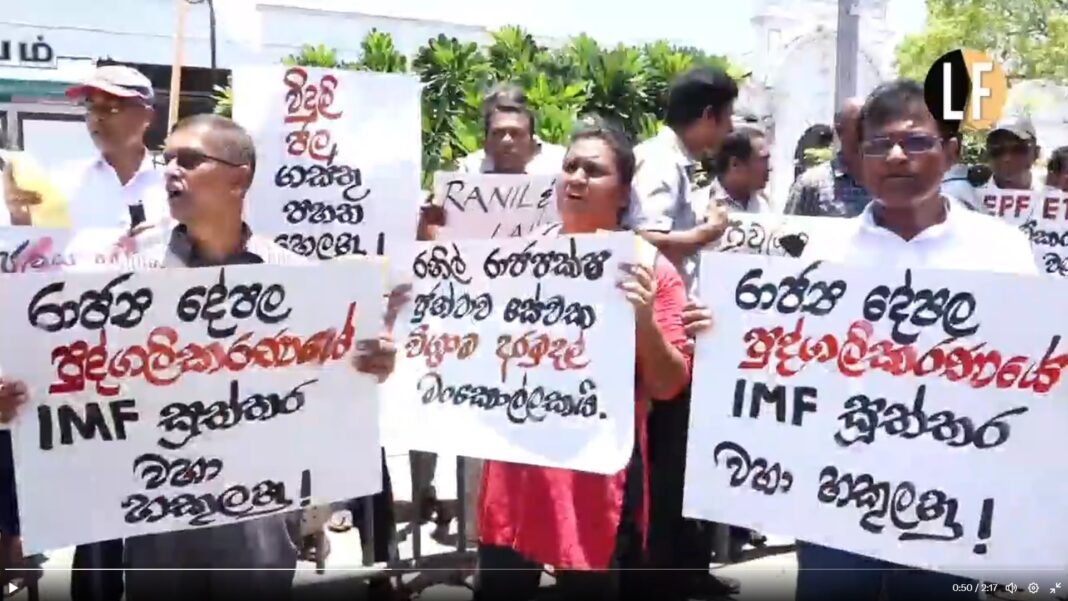By Prof. C.P. Chandrasekhar, Dr. Amali Weligedara and Charith Gunawardena/ Daily FT.
Institute for Political Economy: The International Monetary Fund (IMF) issued an end-of-mission press release on 27 September 2023, with its preliminary findings on economic performance and policies underpinning the first review under the IMF Extended Fund Facility (EFF) arrangement with Sri Lanka.1
“In sum, the austerity driven objectives of the IMF-supported program both fail to provide macroeconomic stability or improve welfare.”
The IMF is yet to reach a staff-level agreement with Sri Lanka that would lead to the release of the second tranche of the line of credit, essentially because Executive Board approval “requires the completion of financing assurances reviews.”
According to the Fund, “These financing assurance reviews will focus on whether adequate progress has been made with debt restructuring to give confidence that it will be concluded in a timely manner and in line with the program’s debt targets.” While IMF intervention was justified on the grounds that it will facilitate debt restructuring, the release of funds promised in return for implementation of conditionality-linked policies is being held back on the grounds that the restructuring is yet to occur.
Meanwhile, the IMF mission team recognised that inflation is down from a peak of 70% to 2% in September. But there is only a hint as to why, besides international factors that are once again turning adverse, the war against inflation has been temporarily won. It clearly is linked to Sri Lanka’s ability to use foreign exchange support from the IMF and bilateral and multilateral creditors to ease shortages of essentials through imports. The result is that despite the external support, international reserves of just $ 1.5 billion during March-June is by no means strong and adequate for Sri Lanka to begin servicing debt even after restructuring.
“The reforms have contributed to 42.9% of under-fives in Sri Lanka having some form of under-nutrition.”
The IMF’s focus of attention is the absence of adequate fiscal consolidation, stemming partly from the fact that it expects revenues to increase by resort to weak measures that “strengthen tax administration, remove tax exemptions, and actively eliminate tax evasion”, rather than resort to direct taxation of incomes and wealth of the rich and international corporations. In fact, revenue mobilisation is expected to fall short of initial projections by nearly 15% by year end.
Yet the stringent primary balance targets have been met. For that, the burden of fiscal adjustment has fallen on expenditure with two consequences. One is a contraction in economic activity with real GDP growth in the second quarter estimated at a negative 3.1% on a year-on-year basis. That contraction will only reduce resource mobilisation even further and worsen the fiscal crisis. The other is a further erosion of the Government’s ability to offer minimal social protection to an economically devastated population and to provide essential public services.
In sum, the austerity driven objectives of the IMF-supported program both fail to provide macroeconomic stability or improve welfare. The attempt to support fiscal consolidation by shifting attention away from critical external debt restructuring, particularly debts owed to external private creditors, to domestic debt restructuring through an attack on pensions will only make matters worse.
In its latest press release, IMF cheers the “remarkable resilience” of the Sri Lankan people and the “significant progress on important reforms” made by the local authorities, glossing over the fact that this so-called resilience implies an exorbitant cost in terms of various social indicators including those relating to health and education. The reforms have contributed to 42.9% of under-fives in Sri Lanka having some form of under-nutrition.
Structural adjustment reforms have also destroyed opportunities for growth in local manufacturing industries and agriculture sectors. Poor governance, harmful tax policies, imported inflation and monopoly profiteering that contributed significantly to high inflation in Sri Lanka are being ignored. Instead, the IMF is curbing monetary expansion and demanding a cutback in fiscal spending that is essential to drive growth and reduce economic hardships faced by people.
“There is little transparency of discussions between the IMF and the Government. Opportunity for timely public and parliamentary scrutiny of these discussions are essential for local democracy.”
The IMF applauds the Anti-Corruption Act passed in Parliament, but fails to adequately expose the role of poor governance and ongoing corruption that halts existing legislation being used to curb tax evasion, illicit financial flows and recovery of stolen assets that contribute to their initial revenue projections falling short by nearly 15% by year end.
Although the IMF issued a comprehensive Governance Diagnostic Assessment, it is essential that any updated report addresses these failures, and removes the onus of fiscal adjustment falling on public expenditure to recoup fiscal shortfall.2 There is little transparency of discussions between the IMF and the Government. Opportunity for timely public and parliamentary scrutiny of these discussions are essential for local democracy.
Poverty rates have risen to over 30% in Sri Lanka. Many women have been pushed into destitution. The unjust electricity tariff schemes, taxation policies, domestic debt restructuring plans, social welfare programs and other measures continue to burden the poorest in Sri Lanka.
The IMF continues with recommendations that safeguard interests of global commercial money markets and domestic investors. It fails to communicate mitigating steps Sri Lanka needs to take to protect itself from the gross imperfections of the international financial architecture.
It is Sri Lanka’s external debt burden owned to private creditors that requires urgent restructuring.
Protecting the well-being of Sri Lanka’s poor surely needs to become the priority.
Footnotes:
1IMF Staff Concludes Visit to Sri Lanka (September 27, 2023)
https://www.imf.org/en/News/Articles/2023/09/27/pr23326-imf-staff-concludes-visit-to-sri-lanka
2Sri Lanka: Technical Assistance Report – Governance Diagnostic Assessment (September 30, 2023)
https://www.imf.org/en/Publications/CR/Issues/2023/09/29/Sri-Lanka-Technical-Assistance-Report-Governance-Diagnostic-Assessment-539804
